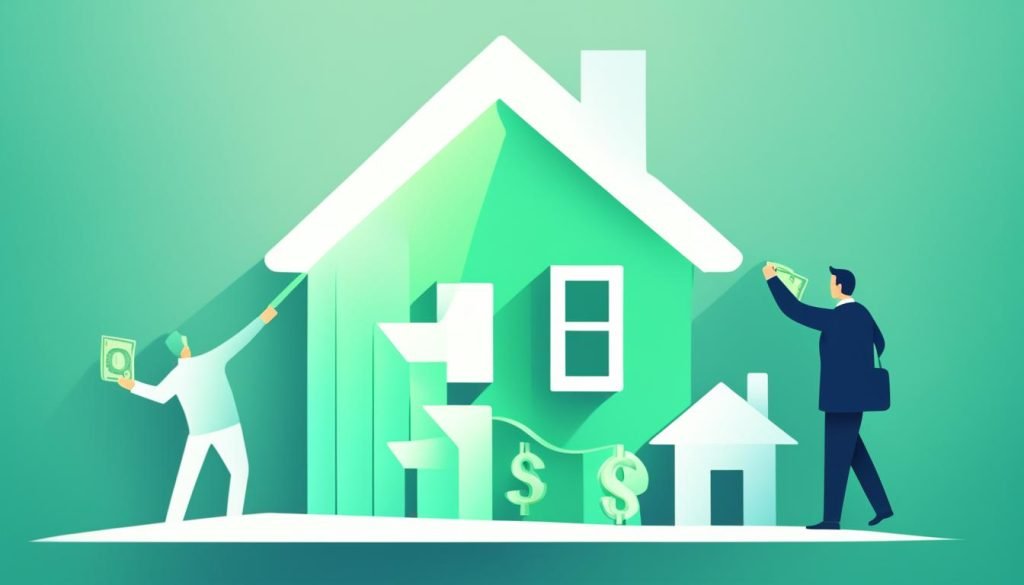Refinancing your mortgage can bring many advantages. By getting a new loan, you might pay less in interest and have smaller monthly payments. You can also tap into your home’s equity. This involves looking at your current loan, comparing different lenders, and applying for a new mortgage. The goal is to lower your costs and better your financial health.
Key Takeaways:
- Refinancing can mean paying less interest and fewer monthly fees.
- You can use your home’s equity this way.
- Changes in loan terms can make you more financially secure.
- It’s a chance to boost your credit and merge your debts.
- Picking a good lender is key to making the most of this option.
Saving on Interest Through Refinancing
Many homeowners choose to refinance their mortgage to save on interest. Interest rates can move due to market changes. If interest rates have dropped since you first got your mortgage, you might be paying more than you should.
If you can get a refinanced loan with a lower interest rate, you may pay less each month. This lowers the total amount of interest you’ll pay over time.
Tools like mortgage refinance calculators are great for estimating your savings. They compare your current mortgage with the potential savings on a new loan. You can see how your current balance, interest rate, and remaining loan term affect your costs.
For example, let’s say you have a $200,000 mortgage at 4.5% for 30 years. If you can lower the rate to 3.5%, you could save a lot on interest over the life of the loan.
“Refinancing my mortgage was a great move that saved me money. The lower rates cut my payments and interest costs too.”
Yet, remember that refinancing has its own costs, like closing fees and appraisals. It’s key to include these costs in your decision-making process.
Potential Savings with Refinancing
| Current Mortgage | New Mortgage | Savings |
|---|---|---|
| Loan Balance | $200,000 | $200,000 |
| Interest Rate | 4.5% | 3.5% |
| Loan Term | 30 years | 30 years |
| Monthly Payment | $1,013.37 | $898.09 |
| Total Interest Paid | $164,813.42 | $114,311.65 |
By refinancing and lowering the interest rate, your monthly payment may go down. In our scenario, it dropped from $1,013.37 to $898.09. This saves you $115.28 every month. Over 30 years, you could save over $50,000 in interest.
Using a refinance calculator can show you how much you might save. It’s a smart way to look at various refinancing options. You can consider different loans to make a well-informed choice.
Refinancing to a lower rate can help you save money. This extra cash can go towards paying off debt, saving for retirement, or fixing up your home. It can improve your financial situation and give you more choices.
Accessing Home Equity and Cash-Out Refinancing
Refinancing your mortgage can help you use your home’s equity. This means you get extra money when you refinance your home loan. This money can be used for things like making your home better, paying off debt, or investing.
You can get this extra money based on how much your home is worth and how much you owe. It’s a way to turn the value of your home into cash for your needs.
Usually, the interest rate for a cash-out refinance is lower than what you’d pay on a credit card or a personal loan. So, it can be a smart way to borrow money because it’s cheaper with favorable mortgage rates.
“A cash-out refinance provides homeowners with the opportunity to unlock the value in their homes. It allows them to leverage their home equity for various purposes, whether it’s making necessary home improvements or consolidating high-interest debt.”
If you do a cash-out refinance, you can merge several debts into one. You might pay less in interest, and keeping track of your money becomes easier with a single monthly payment.
Think about what you want financially and talk to a trustworthy lender to see if a cash-out refinance is right for you. They can look at your home’s worth, suggest the best loan options, and help you throughout the refinancing process. This way, you make wise choices about your home equity.

Key Benefits of a Cash-Out Refinance:
- Access to funds for home improvements, debt consolidation, or investments
- Potentially lower interest rates compared to other borrowing options
- Consolidation of high-interest debts into a single manageable payment
- Opportunity to leverage built-up equity in your home
Learning about the positives and possible outcomes can lead to a good decision. Planning well and getting help from experts can make using your home equity through a cash-out refinance the right move for you.
| Pros | Cons |
|---|---|
| Access to additional funds for various purposes | Increases debt by refinancing for a higher loan amount |
| Potentially lower interest rates compared to other borrowing options | May extend the term of your mortgage, resulting in more interest paid over time |
| Consolidation of high-interest debts into a single manageable payment | Requires careful consideration of your financial goals and long-term plans |
| Ability to leverage built-up equity in your home | May incur closing costs and fees associated with the refinance process |
Adjusting Loan Terms for Financial Flexibility
Refinancing your mortgage lets you tweak your loan term to meet your money goals better. You can pick a shorter term or go for steady monthly payments. Refinancing has the answers you seek.
Shorter Loan Term
Shortening your loan term speeds up owning your house and increases its equity faster. A shorter term means you pay less interest overall. This saves you lots in interest, getting you home-free quicker.
Imagine you have 25 years left on your mortgage at 4% interest. By switching to a 15-year loan at 3.5%, you save money and pay off your house sooner. It’s great if you’re nearing retirement or have life goals to meet without a mortgage.
Stable Monthly Payments
Want steady expenses and more cash flow for other needs? Extending your loan term might be best. This move lowers your monthly pay but spreads the cost out longer.
For example, with 20 years left on your mortgage, if the payments are too much, a 30-year loan could help. It eases your monthly load, making payments smoother.
But, remember, a longer term means you spend more on interest. Yet, it might be worth it to manage your money better. You could use the saved cash for other vital things like investing or saving for emergencies.
Changing to a fixed-rate loan might also be smart. It keeps your monthly payments from jumping around if interest rates rise. This adds peace of mind about your mortgage costs not increasing unpredictably.
“Refinancing let me change to a 15-year fixed-rate from a 30-year adjustable mortgage. I got a lower rate and knowing my bills are steady is a big relief.”
Wrap Up
Mortgage refinancing is a tool for fitting your loan terms to your financial plans. It offers ways to pay off your mortgage faster or make your monthly payments more even. Talking to a good lender can help you understand your choices and find what’s right for you.

Conclusion
Mortgage refinancing lets you enjoy many perks for your money. Lower interest rates are one of the main wins. You also get to use home equity and change the loan’s terms. This can boost your savings and make you more financially stable.
Locking in a lower interest rate means your monthly payments might go down. This saves you a lot of money over time. And, you could get a cash-out refinance. That gives you cash for big spending needs, like renovations or paying off debt.
Refinancing might even help your credit score. Paying your new loan on time shows you’re good with money. This can make your credit score rise. Then, getting loans in the future might be easier and cheaper.
Refinancing can also simplify how you pay debts. You could use the money to clear high-interest debts. This way, you’d have just one lower payment to worry about. You’d likely save on interest too, cutting costs.
To get the best out of refinancing, start by looking at what lenders offer. Talk to experts and check all the details of their deals. Planning well and getting the right advice can really change your financial game for the better. This can help you save more, stabilize, and meet big money goals.




